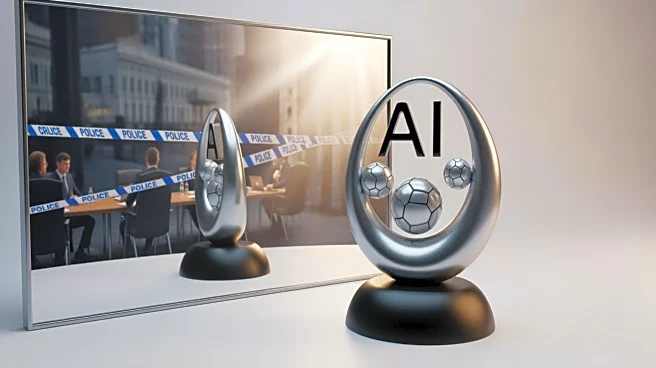What's Happening?
Italian artist Michelangelo Pistoletto, known for his Mirror Paintings, is showcasing his work alongside Pablo Picasso's Cubist pieces at Helly Nahmad Gallery in London. Pistoletto, a pioneer of Arte Povera, reflects on the impact of AI and the role of art in shaping
society. He emphasizes that AI will not destroy humanity, but rather, humans are responsible for their own fate. Pistoletto's philosophy, the 'Third Paradise,' suggests that art can foster global harmony and peace. Despite his serious illness during the Covid-19 pandemic, Pistoletto's outlook remains unchanged, focusing on art's potential to reorganize society.
Why It's Important?
Pistoletto's insights highlight the intersection of art, technology, and societal change. His belief in art's ability to influence peace and harmony underscores the cultural sector's potential impact on global issues. As AI continues to evolve, Pistoletto's perspective offers a counter-narrative to fears of technological dominance, suggesting that human creativity and responsibility are paramount. His nomination for the Nobel Peace Prize further validates the role of art in fostering dialogue and understanding, potentially influencing public policy and cultural initiatives worldwide.
What's Next?
Pistoletto plans to launch an exhibition in Monza focused on spirituality and art's role in peace. This project aims to further explore the power of art as a tool for societal change, emphasizing the unity of religions and the responsibility of art in creating a preventive peace. The exhibition will include works from the 1950s, continuing Pistoletto's lifelong exploration of spirituality and creativity.
Beyond the Headlines
Pistoletto's work challenges traditional perspectives on art and its societal role, advocating for a holistic approach to creativity that encompasses ethical and philosophical dimensions. His 'Third Paradise' philosophy encourages a reevaluation of human values and priorities, potentially influencing cultural and educational frameworks.

















